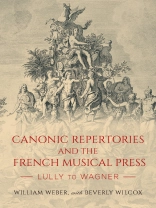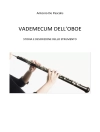A bold application of the concept of ‘canonical’ works to the development of French operatic and concert life in the eighteenth and nineteenth centuries.
This long-awaited book by a leading historian of European music life offers a fresh reading of concert and operatic life by showing how certain musical works in eighteenth- and nineteenth-century France came to be considered ‘canonic’: that is, admirable and worthy of being taken as models. In a series of interlinked essays, William Weber draws particular attention to the ways in which such reputations could shift in different eras and circumstances.
The first chapter outlines how such a surge of reputation came about for Jean-Baptiste Lully after his death in 1687, followed a century later by one for the operas of Christoph-Willibald Gluck and Niccolò Piccinni. Next, Beverly Wilcox contributes a crucial chapter exploring how a canon of sacred works evolved at the Concert Spirituel between 1725 and 1790. Subsequent chapters detail the rise of an ‘incipient canon’ for Joseph Haydn’s music in the 1780s; a new operatic canon centered on works of Gioachino Rossini and Giacomo Meyerbeer; a century-long canonic repertory at the theater of the Opéra-Comique; and, between 1860 and 1914, frequent concert performances of excerpts from Wagner’s operas, sometimes along with excerpts from Meyerbeer’s.
Throughout, Weber and Wilcox demonstrate how the French musical press reflected musical taste, and also shaped it, across two centuries.
İçerik tablosu
Introduction
The Domestic versus the Foreign in Eighteenth-century Paris and London
Elements of canon Formation at the Concert Spirituel, by Beverly Wilcox
To Praise or to criticize? The evolution of music criticism in eighteenth-century France
Haydn in the press during the 1780s: How did a Canon Arise?
Parallel canons at the Opéra and the Comédie-Française at the end of the Ancien Régime
Negotiating repertory, public demand, and les progrès de la musique at the Paris Opéra, 1815-1830
Tracing the evolution of le vieux répertoire at the Opéra-Comique in the nineteenth century
Richard Wagner, concert life, and musical canon in Paris, 1860-1914
An Afterward
Bibliography
Notes
Yazar hakkında
WILLIAM WEBER is professor emeritus of history at California State University, Long Beach.












